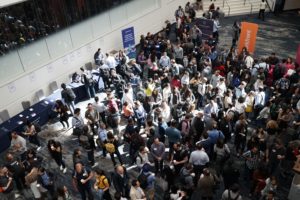A Reaffirmation on Medical Conferences
It is safe to say that AHA Scientific Sessions 2021, conducted virtually from November 13th to 15th was a big hit. The ease and flexibility of attending the Sessions from the comfort of my couch made me forget my initial concerns of missing out on the in-person experience. It will be interesting to see how the pandemic, and seeping of Zoom into our lives, change the future of medical conferences. Regardless of time and place, conferences will continue to be an important feature in medicine, especially in a constantly evolving field like cardiology. Here I discuss some of the reasons that drive us to attend medical conferences, and why we should continue to do so.

(Image from Creative Commons)
Present your work
Disseminating your research can be as important as the scientific process itself. Conferences are an excellent forum to present your findings in a timely manner, especially since publication can be a very long-drawn-out process. Presenting abstracts at conferences helps trainees build their CVs to reflect their interests and scholarly work. Although it can be nerve-wracking, presenting at conferences forces you to communicate about your work effectively. Addressing questions from experts and incorporating the feedback received can help with framing the manuscript for publication.
Keep up-to-date with the latest science
Undoubtedly the release of new study data creates the loudest buzz during medical conferences. Audiences gather to witness the release of trials that will influence clinical practice. You have the opportunity to interact with the investigators and address questions relevant to you and your patients. When not in the late-breaking sessions, there are poster/ presentation sessions to attend. You can also learn about the latest innovations from the industry and try your hand at new technologies showcased by vendors.
Get inspired
Even when not presenting, attending scientific conferences is an active process. Reviewing the latest trials and abstracts promotes critical thinking and sparks ideas. You notice the gaps in knowledge and may be inspired to address that in your research. You can learn from others’ successes and mistakes.
Learn/ refresh your knowledge
Medical conferences are a good place to catch up on the existing knowledge and earn CME points. Most conferences have workshops or skills-training sessions incorporated within the schedule. Lectures from distinguished speakers can provide you with a high-level review of a topic. Panel discussions bring together opinions from trainees, established clinicians, and researchers and can give a sense of what the coming years will bring to the field.
Form connections
Networking has become crucial for a career in medicine, whether in academia or private practice. Conferences are arguably the best place to establish and foster contacts with people at different stages of their careers. You have the opportunity to meet experts who you look up to, introduce yourself, and take advice. Your name might stick with potential employers, increasing your chances of landing a position in the future. For trainees, it may translate into gaining lifelong mentors or sponsors. Conferences are also a good place to meet peers, share ideas and experiences, and potentially set up collaborations.
Share the passion
Finally, there is a special joy in nerding along with others who nurture the same passion for medicine as you. People from different countries and at varying stages of their careers are brought together during the conferences. Knowing that there is a whole community of people with similar interests can motivate you for long after the conference is over.
All in all, attendees come out of a conference smarter, inspired, and excited for the next conference.
Below is a list of the upcoming major conferences in Cardiology. Hope to see you there!

“The views, opinions and positions expressed within this blog are those of the author(s) alone and do not represent those of the American Heart Association. The accuracy, completeness and validity of any statements made within this article are not guaranteed. We accept no liability for any errors, omissions or representations. The copyright of this content belongs to the author and any liability with regards to infringement of intellectual property rights remains with them. The Early Career Voice blog is not intended to provide medical advice or treatment. Only your healthcare provider can provide that. The American Heart Association recommends that you consult your healthcare provider regarding your personal health matters. If you think you are having a heart attack, stroke or another emergency, please call 911 immediately.”
